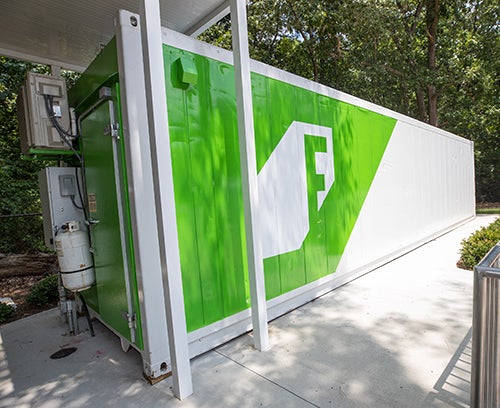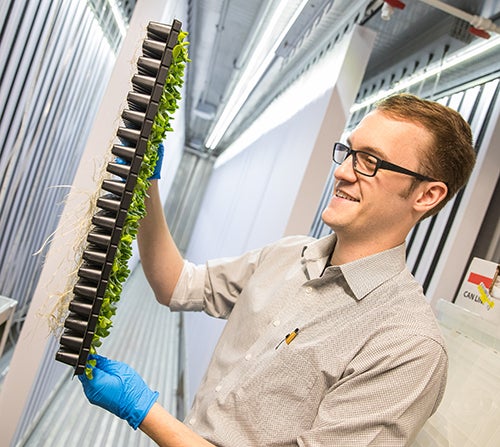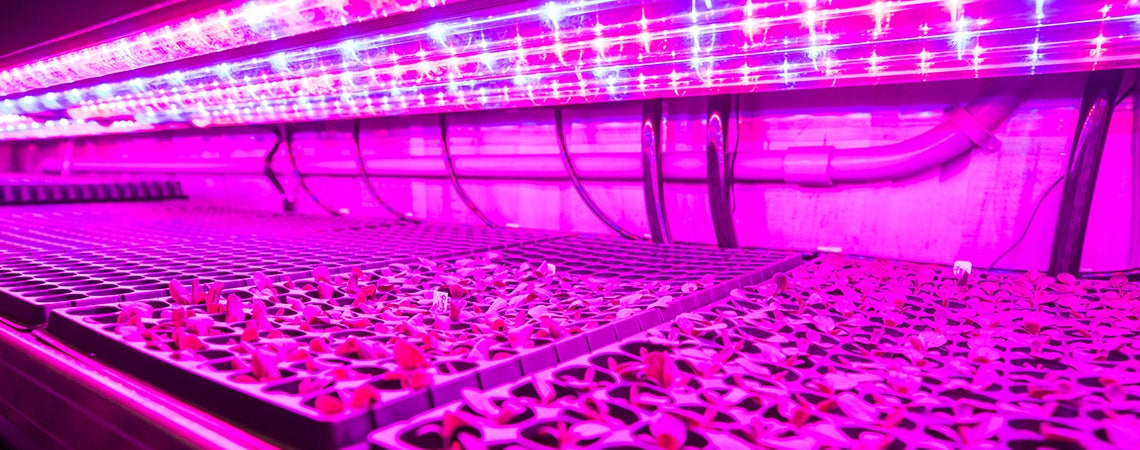GREEN THUMBS
Innovative project adds sustainable options to campus dining
With the help of a green thumb, East Carolina University’s next wave of food sustainability debuted during this year’s College Hill Block Party.
Greens, organically grown in a shipping container behind Jones Residence Hall, were served with a soy salmon bowl to the more than 5,000 students who attended the event.
Freshman Allison Clemmer of Greensboro was one of the first students to try the greens. She’s happy to know she has additional options when choosing what to eat on campus.
“I try to eat as healthy as possible, so knowing it’s organic helps a lot,” said Clemmer.
Unbeknownst to Clemmer and the other students, the greens started off in the container as a seedling eight weeks ago. The shipping container was put together by Freight Farms in Boston. ECU’s Dining Services, a part of Campus Living within Student Affairs, purchased the container to be used and managed by Aramark, which provides all dining services at the University.

Container farming has taken root behind Jones Residence Hall. Ideal conditions in the container will allow these seeds to germinate, grow and be ready for harvest in eight weeks.
The container provides the perfect environment for growing leafy vegetables, and the process is relatively straightforward. Seeds are introduced to seedling plugs. These plugs are then flooded with water while in a seedling trough. With the appropriate amount of moisture, the seeds germinate for a week in an environment of ideal, controlled humidity and 16 hours of light.
Then, they are moved back to the seedling trough for two weeks where they are flooded with water every eight hours. Then, they are moved into a crop column, which looks like a PVC fence post with a slit down the side and has an elaborate watering system. It’s here they will grow for five weeks before harvesting.
From this process alone, ECU will be able to harvest 500 heads of lettuce — the equivalent of 2 acres of traditional crops, every five weeks. Annually, the freight farm will have 10 growing cycles and produce 5,000 heads of lettuce. These harvested greens will be added to prepared, specialty salads and salad bars.
Ian McMillan manages the Freight Farm container for Aramark. He’s a 2012 graduate of ECU’s College of Business and its School of Hospitality Leadership. Sustainability in tourism and hospitality is huge and from a hospitality standpoint, this approach to growing food makes good business sense, he said.
“It’s the right thing to do,” McMillan said.

Aramark location manager Ian McMillan ‘12 oversees the Freight Farms container.
Container farming is not Dining Services first introduction to sustainability. Five years ago, ECU made a conscious effort to reduce food waste, energy consumption and landfill impact. To do so, it looked at the interaction between food and campus.
“We have 32 different places on campus where people purchase food,” said Bill McCartney, ECU’s associate vice chancellor for campus living. “That’s equal to 165,000 customer interactions with food on campus weekly. That’s a staggering amount.”
That amount can generate a large amount of food and materials waste, so Dining Services implemented initiatives to be more sustainable. For example, trays were eliminated in dining halls, which has saved more than 100,000 gallons of hot water annually. LED lighting has been installed in all 32 dining facilities. Straws have also been eliminated, as well as Styrofoam takeout containers.
“We were using 157,000 containers annually,” said McCartney. “That’s enough to stretch from Kinston and back. That’s a round trip of 56 miles.”
Dining Services also weighs all the food in the dining halls, and this act alone has reduced waste by 40 percent. And, leftover food goes to Campus Kitchen, a student organization that can use the food to feed less-fortunate families in Greenville.
McCartney says these activities, along with the “grow local” container farming approach, are something students want.
“Today’s students grew up with the Food Network, which is a different food experience from 20 years ago,” said McCartney. “They want their food to be a personalized restaurant experience, and this level of involvement includes wanting to know where their food comes from.”
Sustainability has not only rooted in ECU’s Dining Services, but the School of Hospitality Leadership in the College of Business has taken notice. Its food kitchen lab experience uses products from its campus garden, and the graduate program in sustainable tourism and hospitality was built to meet the demands of not only industry, but of the students who come through the program.
“Sustainability is an issue that’s top of mind with today’s hospitality professional,” said Dr. Robert O’Halloran. “The farm-to-table, ‘grow local’ movement is a need we saw coming so we’re addressing it with our students.”
What’s Next?
McCartney is quick to point out that this sustainable approach will complement the university’s commitment to buying local. ECU’s Dining Services will continue to support area farmers by purchasing their products and making them available to students.
“We promote when we buy locally,” said McCartney. “We think this is something the students will find attractive.”
However, don’t look for more farming containers at ECU anytime soon.
“We need to become fully functional and be good urban farmers over the next two to three years before we consider the next expansion,” said McCartney.
